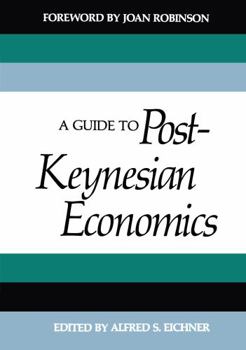A Guide to Post-Keynesian Economics
Select Format
Select Condition 
Book Overview
Does there exist an alternative to the "neoclassical synthesis" presented to students in introductory, intermediate, and advanced economics courses? The alternative is the post-Keynesian theory which is the subject of this book.
Format:Paperback
Language:English
ISBN:0394737261
ISBN13:9780394737263
Release Date:January 1979
Publisher:Routledge
Length:224 Pages
Weight:0.55 lbs.
Customer Reviews
1 rating
Best Introduction to Post Keynesian Economics
Published by Thriftbooks.com User , 16 years ago
This book is a collection of essays by the leaders in what has come to be called post-Keynesian economics. Post-Keynesian economics represents a coherent alternative to mainstream economic theory by emphasizing certain features of the market economy while simultaneously questioning the analytical validity of the main assumptions that make up the mainstream view. Post-Keynesian economics, like Austrian economics, believes very much in the radical uncertainty of the future. Since action is always directed toward the future, and this state is unknowable, then the concept of equilibrium is self-contradictory. However, post-Keynesians differ with Austrians on matters of policy, because unlike Ausrtians, post-Keynesians do not believe in the existence of "forces" that mainstream theorists typically ascribe to the economic system. For example, post-Keynesians do not believe in the "law of substitution" which explains the effects of relative price changes. For every other economist (Austrians included), this law is fundamental. This is how markets are presumed to clear. If goods in one area are not used, their price will fall causing entrepreneurs to substitute them for other goods. This leads to full utilization and efficiency in production. Post-Keynesians disagree with this argument for many reasons. Without going into great detail, I can say that the various criticisms by post-Keynesians of this theory are all presented in this book, ranging from Joan Robinson to Pierro Sraffa and J. M. Keynes. Another interesting aspect of post-Keynesian economics is its emphasis on the "unevenness of the growth process." The basic idea is that not all factors included in the growth process grow or expand at the same constant rate, and the recognition of this fact will reveal to one the causes of economic disruptions. Recessions, unemployment, and even inflation can all be explained by the unbalanced nature of economic growth. Two other important themes of post-Keynesian economics are the theory of pricing and the emphasis on "mark ups" and their belief in the endogeneity of the money supply. Post-Keynesian economics is a rich and controversial field of economic science. It is relentless in its criticism of mainstream theory, and it has succeeded in making very important positive contributions to economics in the form of a persuasive and seemingly complete alternative. Anyone interested in post-Keynesian economics should begin their study with this book.





